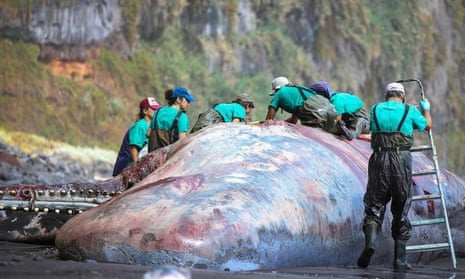When a sperm whale washed up dead on a beach in the Canary Island of La Palma no one imagined a valuable treasure was hidden in its entrails.
Heavy seas and a rising tide made it difficult to carry out a postmortem, but Antonio Fernández Rodríguez, head of the institute of animal health and food security at the University of Las Palmas, was determined to find out why the whale had died.
Suspecting a digestive problem, he inspected the animal’s colon – and felt something hard stuck to that part of the intestine. “What I took out was a stone about 50-60cm in diameter weighing 9.5kg,” he said. “The waves were washing over the whale. Everyone was watching when I returned to the beach but they didn’t know that what I had in my hands was ambergris.”

Ambergris is a rare substance, often known as floating gold, that has been the holy grail of perfumers for centuries. The lump Fernández held in his hand was worth about €500,000 (£430,000).
The origin of ambergris, produced by about one in 100 sperm whales, was only solved when large-scale whaling began in the early 19th century. Whales eat large quantities of squid and cuttlefish, most of which cannot be digested and is vomited out. But some remains, and over the years binds together in the whale’s intestines to form ambergris.
This is sometimes excreted, which is why ambergris is most commonly found floating in the sea. But sometimes, as in the case of the whale in La Palma, it grows too large, rupturing the intestine and killing the whale.
Ambergris has a woody scent like sandalwood but also contains ambrein, an odourless alcohol that can fix and extend the life of scents, hence its popularity among perfumers.

The US, Australia and India have banned the trade in ambergris as part of the ban on hunting and exploiting whales.
Fernández, who has conducted autopsies on more than 1,000 whales, said sepsis caused by the ambergris killed the whale.
after newsletter promotion
The institute is looking for a buyer, and Fernández said they hoped funds raised would go towards helping victims of the volcano that erupted on La Palma in 2021, which caused more than €800m (£685m) in damage and destroyed hundreds of homes and businesses.
“The law is different in every country,” Fernández said. “In our case, I hope the money will go to the island of La Palma, where the whale ran aground and died.”
In one of his many digressions in Moby-Dick, the novelist Herman Melville dedicates an entire chapter to ambergris, which he describes as “soft, waxy, and so highly fragrant and spicy, that it is largely used in perfumery … Who would think, then, that such fine ladies and gentlemen should regale themselves with an essence found in the inglorious bowels of a sick whale! Yet so it is!”
